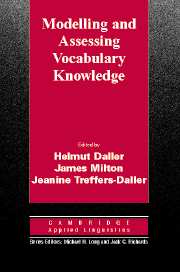Book contents
- Frontmatter
- Contents
- List of contributors
- List of abbreviations
- Acknowledgements
- Foreword
- Series Editors' Preface
- Editors' introduction
- I Fundamental issues
- II Vocabulary and learner differences
- Chapter 2 Lexical profiles, learning styles and the construct validity of lexical size tests
- Chapter 3 Learners' response behaviour in Yes/No Vocabulary Tests
- III The unit of assessment and multiple vocabulary measures
- IV Metaphors and measures in vocabulary knowledge
- V Vocabulary measures in use
- References
- Appendices
- Index
Chapter 2 - Lexical profiles, learning styles and the construct validity of lexical size tests
Published online by Cambridge University Press: 04 May 2010
- Frontmatter
- Contents
- List of contributors
- List of abbreviations
- Acknowledgements
- Foreword
- Series Editors' Preface
- Editors' introduction
- I Fundamental issues
- II Vocabulary and learner differences
- Chapter 2 Lexical profiles, learning styles and the construct validity of lexical size tests
- Chapter 3 Learners' response behaviour in Yes/No Vocabulary Tests
- III The unit of assessment and multiple vocabulary measures
- IV Metaphors and measures in vocabulary knowledge
- V Vocabulary measures in use
- References
- Appendices
- Index
Summary
Introduction
This chapter will consider in more detail the first of the validity questions which Nation raises in the opening chapter: that of the individual variables each learner will bring to the testing process. Lexical knowledge, like all language knowledge, is not a directly accessible quality like a person's height or weight. In tests, therefore, we rely on the learners themselves to demonstrate their knowledge so we can assess it or measure it. In the opening chapter Nation points out that this is inherently problematic for the validity of a test and its results. If a learner is uninterested and does not try, or guesses a lot, or gives up half way through the test, then the score cannot accurately reflect the learner's true knowledge or ability. The validity of any test of this kind relies on the assumption that learners will behave reasonably, and reasonably consistently, in trying to show what knowledge they have.
In reality we know that learners faced with a test do not always behave either reasonably or consistently. Vocabulary size testing, which makes extensive use of objective style questions, is particularly open to learners using, or attempting to use, test-taking strategies in the hope of maximising their score rather than accurately reflecting their knowledge. A test such as the Eurocentre's Vocabulary Size Test (Meara and Jones, 1990) makes a calculation of a testee's guesswork based on responses to false words contained in the test and, if guessing is sufficiently high, indicates an accurate assessment cannot be made.
- Type
- Chapter
- Information
- Modelling and Assessing Vocabulary Knowledge , pp. 47 - 58Publisher: Cambridge University PressPrint publication year: 2007
- 20
- Cited by



